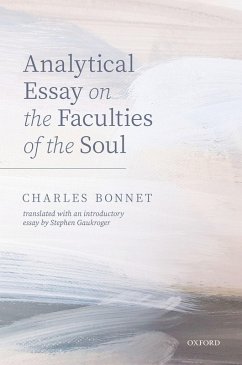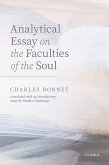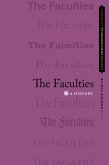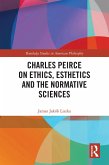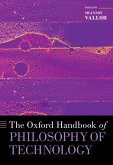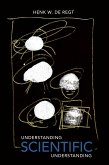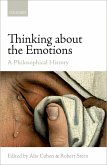Charles Bonnet, Analytical Essay on the Faculties of the Soul (eBook, PDF)


Alle Infos zum eBook verschenken

Charles Bonnet, Analytical Essay on the Faculties of the Soul (eBook, PDF)
- Format: PDF
- Merkliste
- Auf die Merkliste
- Bewerten Bewerten
- Teilen
- Produkt teilen
- Produkterinnerung
- Produkterinnerung

Hier können Sie sich einloggen

Bitte loggen Sie sich zunächst in Ihr Kundenkonto ein oder registrieren Sie sich bei bücher.de, um das eBook-Abo tolino select nutzen zu können.
In the course of the eighteenth century, understanding human cognitive life came to be construed as something to be explored in terms of the physiology of the sensory organs, the nerves, and the brain: a form of naturalization that effectively moved cognition out of the realm of philosophy as it had traditionally been understood. Bonnet's Analytical Essay on the Faculties of the Soul was at the forefront of these developments, and this is its first English translation. Drawing on his earlier work in natural history-he was the leading entomologist of his era-he approaches problems of the nature…mehr
- Geräte: PC
- mit Kopierschutz
- eBook Hilfe
- Größe: 1.41MB
![Charles Bonnet, Analytical Essay on the Faculties of the Soul (eBook, ePUB) Charles Bonnet, Analytical Essay on the Faculties of the Soul (eBook, ePUB)]() Charles Bonnet, Analytical Essay on the Faculties of the Soul (eBook, ePUB)55,95 €
Charles Bonnet, Analytical Essay on the Faculties of the Soul (eBook, ePUB)55,95 €![The Faculties (eBook, PDF) The Faculties (eBook, PDF)]() The Faculties (eBook, PDF)33,95 €
The Faculties (eBook, PDF)33,95 €![Charles Peirce on Ethics, Esthetics and the Normative Sciences (eBook, PDF) Charles Peirce on Ethics, Esthetics and the Normative Sciences (eBook, PDF)]() James Jakób LiszkaCharles Peirce on Ethics, Esthetics and the Normative Sciences (eBook, PDF)40,95 €
James Jakób LiszkaCharles Peirce on Ethics, Esthetics and the Normative Sciences (eBook, PDF)40,95 €![The Oxford Handbook of Philosophy of Technology (eBook, PDF) The Oxford Handbook of Philosophy of Technology (eBook, PDF)]() The Oxford Handbook of Philosophy of Technology (eBook, PDF)76,95 €
The Oxford Handbook of Philosophy of Technology (eBook, PDF)76,95 €![Understanding Scientific Understanding (eBook, PDF) Understanding Scientific Understanding (eBook, PDF)]() Henk W. De RegtUnderstanding Scientific Understanding (eBook, PDF)26,95 €
Henk W. De RegtUnderstanding Scientific Understanding (eBook, PDF)26,95 €![Thinking about the Emotions (eBook, PDF) Thinking about the Emotions (eBook, PDF)]() Thinking about the Emotions (eBook, PDF)65,95 €
Thinking about the Emotions (eBook, PDF)65,95 €![Religion and the Cold War (eBook, PDF) Religion and the Cold War (eBook, PDF)]() D. KirbyReligion and the Cold War (eBook, PDF)73,95 €
D. KirbyReligion and the Cold War (eBook, PDF)73,95 €-
-
-
Dieser Download kann aus rechtlichen Gründen nur mit Rechnungsadresse in A, B, BG, CY, CZ, D, DK, EW, E, FIN, F, GR, HR, H, IRL, I, LT, L, LR, M, NL, PL, P, R, S, SLO, SK ausgeliefert werden.
- Produktdetails
- Verlag: Oxford University Press
- Seitenzahl: 320
- Erscheinungstermin: 23. Dezember 2021
- Englisch
- ISBN-13: 9780192662187
- Artikelnr.: 63206675
- Verlag: Oxford University Press
- Seitenzahl: 320
- Erscheinungstermin: 23. Dezember 2021
- Englisch
- ISBN-13: 9780192662187
- Artikelnr.: 63206675
* Preface
* Introduction
* 1: General and preliminary reflections on the nature of man.
* 2: Plan of this work. Man considered under the idea of a statue whose
senses act separately or successively.
* 3: Continuation of the same subject. Thoughts on Condillac's
Treatise on Sensations.
* 4: On the idea one can form of the statue before it begins to sense.
General conceptions of the origin of ideas.
* 5: Reflections on the physics of our being. Thoughts on the nerves,
on the mind, and on the seat of the soul.
* 6: The statue begins to sense by means of smell. Physical relations
in general, and the laws of nature that are arise from them. The idea
of the mechanics of smell, and what results from it in relation to
the soul.
* 7: On the state of the statue immediately after the first sensation.
The birth of pleasure, of desire, and of attention. On the connection
and the relation between ideas in general. Thoughts on memory.
* 8: The statue is stimulated by a new smell. Principles and
conjectures on the connection and the relation of ideas. An
examination of the question whether the diversity of sensations
depends on the diversity of the fibres, or on the diversity of the
movements impressed on identical fibres.
* 9: Continuation of the same subject. Essay on the theory of
remembering. The birth of habit. On the pleasure associated with
novelty. Thoughts on personal identity
* 10: On the natural philosophy of pleasure and sadness. On the
question whether the laws of Union are arbitrary. On the disposition
of the fibres and their effects. Thoughts on activity, and that of
our being in general.
* 11: On the faculty of sensing, considered as a branch of the activity
of the soul. On the question whether the soul is passive when it
perceives or senses. On the determinants of the activity of the soul,
and their causes. On the nature and effects of attention.
* 12: On the will and on freedom. Some errors about the faculties.
Examination of the opinion of Condillac on freedom. Reflections on
the analysis of the soul.
* 13: On the deterioration of the movements of the sensible fibres, and
on the sensations that correspond to them. On desire, its mechanism
and its effects. The generation of dreams. The general idea of the
mechanism that produces them. An examination of the question whether
the soul has many ideas at the same time.
* 14: A general theory of ideas. On sensible ideas. On sensible
abstractions. On the imagination.
* 15: Continuation of the general theory of ideas. On the general
effects of language. On intellectual abstractions. On concepts. On
substance, attributes, and modes. On essence. Reflections on
essences. On the different kinds of concepts.
* 16: Continuation of the general theory of ideas. Continuation of the
effects of language. On reflection in general. On the relation
between abstract ideas and sensible ideas. On the language of
animals. On the effect of reflection on our freedom. On clear,
obscure, distinct, and confused ideas. On the truth and falsity of
concepts. On judgment. On evidence. On reasoning. On method.
* 17: On the idea that the statue has of succession. On surprise and
its causes, nature, and effects in general. On the pleasure
associated with variety, harmony, and beauty. On the birth of
consonance in the soul of the statue.
* 18: On the passions in general. The idea of their mechanism. On self
love. An examination of the question whether the soul remembers
ideas. A critique of some passages in the Essay on Psychology
* 19: New thoughts on the faculties of the soul, and especially on its
activity. In what respects the soul is active. On the freedom of
indifference. On the question whether the soul executes its volitions
itself. On the determinations of sensibility and the will; on their
causes and their effects.
* 20: The present limits on the activity of the soul of the statue. On
the question whether, when the statue has a memory of one of two
sensations, it recognizes at the same time that this sensation has
affected it more strongly. What constitutes the physics of the memory
of sadness and displeasure. On the idea that the statue has of
number, duration, existence, etc.
* 21: Reflections on the analysis of the two first sensations of the
statue. The statue experiences a third sensation. A new sensation
recalls those that have preceded it. Why cannot the fibres that are
excited by a new object excite those that have already been excited
by other objects? Why, when each sensation has its own fibres, does
it happen that the fibres of different kinds are reciprocally
excited?
* 22: The statue experiences three new smells. Inquiry into the
mechanics of memory. The practical consequences that result from this
mechanics. Questions which arise from the current state of the
statue.
* 23: On the state of the statue when all the fibres of smell are put
in play. On the pleasure that it takes in harmonious sequences, and
the effects of this. Thoughts on dreams in general, and on those of
the statue in particular. On visions. On the question whether the
statue can change or modify the order of its sensations. On the
sensible abstractions that the statue can form, and what the natural
philosophy of these abstractions consists in.
* 24: On happiness and unhappiness in the statue. New thoughts on the
self, or personal identity. Reflections on the soul of beasts, and on
materialism. On the personal identity of animals that undergo
metamorphosis, and, on the future state of man. On the personal
identity of animals that can reproduce from cut sections.
* 25: On what happens when a soul transmigrates into the statue. On the
activity and extent of desire. On the state of the statue supposing
it can obtain the objects of its sensations. The general principle of
operations in beasts. Thoughts on these operations. Thoughts on the
scale of sensibility, and on the reality of our sensations. On the
mechanics that links our ideas to one another and to their signs, and
the effects of this linking. On the physics of the material
composition of the works of the mind.
* 26: The statue becomes a thinking being. On the effect of signs on
its brain. Practical upshot. Conclusion.
* 27: Observations on some passages in The Spirit of the Laws relevant
to this analysis.
* Preface
* Introduction
* 1: General and preliminary reflections on the nature of man.
* 2: Plan of this work. Man considered under the idea of a statue whose
senses act separately or successively.
* 3: Continuation of the same subject. Thoughts on Condillac's
Treatise on Sensations.
* 4: On the idea one can form of the statue before it begins to sense.
General conceptions of the origin of ideas.
* 5: Reflections on the physics of our being. Thoughts on the nerves,
on the mind, and on the seat of the soul.
* 6: The statue begins to sense by means of smell. Physical relations
in general, and the laws of nature that are arise from them. The idea
of the mechanics of smell, and what results from it in relation to
the soul.
* 7: On the state of the statue immediately after the first sensation.
The birth of pleasure, of desire, and of attention. On the connection
and the relation between ideas in general. Thoughts on memory.
* 8: The statue is stimulated by a new smell. Principles and
conjectures on the connection and the relation of ideas. An
examination of the question whether the diversity of sensations
depends on the diversity of the fibres, or on the diversity of the
movements impressed on identical fibres.
* 9: Continuation of the same subject. Essay on the theory of
remembering. The birth of habit. On the pleasure associated with
novelty. Thoughts on personal identity
* 10: On the natural philosophy of pleasure and sadness. On the
question whether the laws of Union are arbitrary. On the disposition
of the fibres and their effects. Thoughts on activity, and that of
our being in general.
* 11: On the faculty of sensing, considered as a branch of the activity
of the soul. On the question whether the soul is passive when it
perceives or senses. On the determinants of the activity of the soul,
and their causes. On the nature and effects of attention.
* 12: On the will and on freedom. Some errors about the faculties.
Examination of the opinion of Condillac on freedom. Reflections on
the analysis of the soul.
* 13: On the deterioration of the movements of the sensible fibres, and
on the sensations that correspond to them. On desire, its mechanism
and its effects. The generation of dreams. The general idea of the
mechanism that produces them. An examination of the question whether
the soul has many ideas at the same time.
* 14: A general theory of ideas. On sensible ideas. On sensible
abstractions. On the imagination.
* 15: Continuation of the general theory of ideas. On the general
effects of language. On intellectual abstractions. On concepts. On
substance, attributes, and modes. On essence. Reflections on
essences. On the different kinds of concepts.
* 16: Continuation of the general theory of ideas. Continuation of the
effects of language. On reflection in general. On the relation
between abstract ideas and sensible ideas. On the language of
animals. On the effect of reflection on our freedom. On clear,
obscure, distinct, and confused ideas. On the truth and falsity of
concepts. On judgment. On evidence. On reasoning. On method.
* 17: On the idea that the statue has of succession. On surprise and
its causes, nature, and effects in general. On the pleasure
associated with variety, harmony, and beauty. On the birth of
consonance in the soul of the statue.
* 18: On the passions in general. The idea of their mechanism. On self
love. An examination of the question whether the soul remembers
ideas. A critique of some passages in the Essay on Psychology
* 19: New thoughts on the faculties of the soul, and especially on its
activity. In what respects the soul is active. On the freedom of
indifference. On the question whether the soul executes its volitions
itself. On the determinations of sensibility and the will; on their
causes and their effects.
* 20: The present limits on the activity of the soul of the statue. On
the question whether, when the statue has a memory of one of two
sensations, it recognizes at the same time that this sensation has
affected it more strongly. What constitutes the physics of the memory
of sadness and displeasure. On the idea that the statue has of
number, duration, existence, etc.
* 21: Reflections on the analysis of the two first sensations of the
statue. The statue experiences a third sensation. A new sensation
recalls those that have preceded it. Why cannot the fibres that are
excited by a new object excite those that have already been excited
by other objects? Why, when each sensation has its own fibres, does
it happen that the fibres of different kinds are reciprocally
excited?
* 22: The statue experiences three new smells. Inquiry into the
mechanics of memory. The practical consequences that result from this
mechanics. Questions which arise from the current state of the
statue.
* 23: On the state of the statue when all the fibres of smell are put
in play. On the pleasure that it takes in harmonious sequences, and
the effects of this. Thoughts on dreams in general, and on those of
the statue in particular. On visions. On the question whether the
statue can change or modify the order of its sensations. On the
sensible abstractions that the statue can form, and what the natural
philosophy of these abstractions consists in.
* 24: On happiness and unhappiness in the statue. New thoughts on the
self, or personal identity. Reflections on the soul of beasts, and on
materialism. On the personal identity of animals that undergo
metamorphosis, and, on the future state of man. On the personal
identity of animals that can reproduce from cut sections.
* 25: On what happens when a soul transmigrates into the statue. On the
activity and extent of desire. On the state of the statue supposing
it can obtain the objects of its sensations. The general principle of
operations in beasts. Thoughts on these operations. Thoughts on the
scale of sensibility, and on the reality of our sensations. On the
mechanics that links our ideas to one another and to their signs, and
the effects of this linking. On the physics of the material
composition of the works of the mind.
* 26: The statue becomes a thinking being. On the effect of signs on
its brain. Practical upshot. Conclusion.
* 27: Observations on some passages in The Spirit of the Laws relevant
to this analysis.
